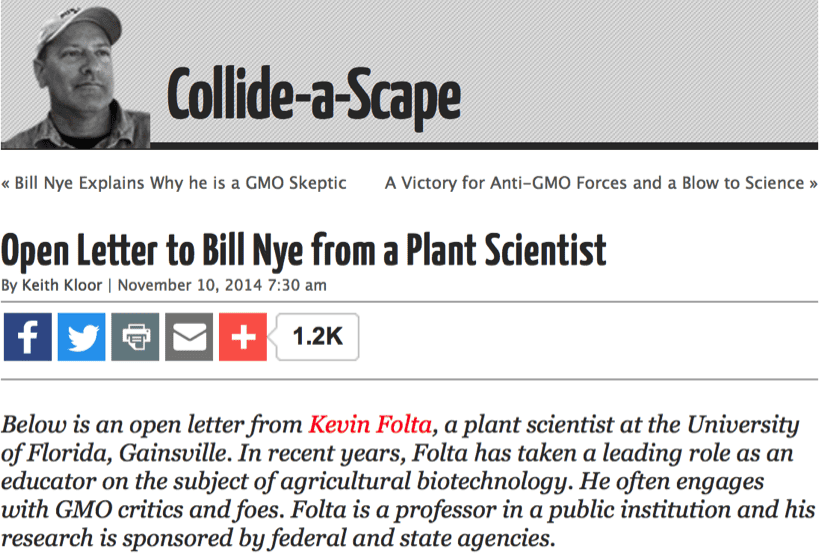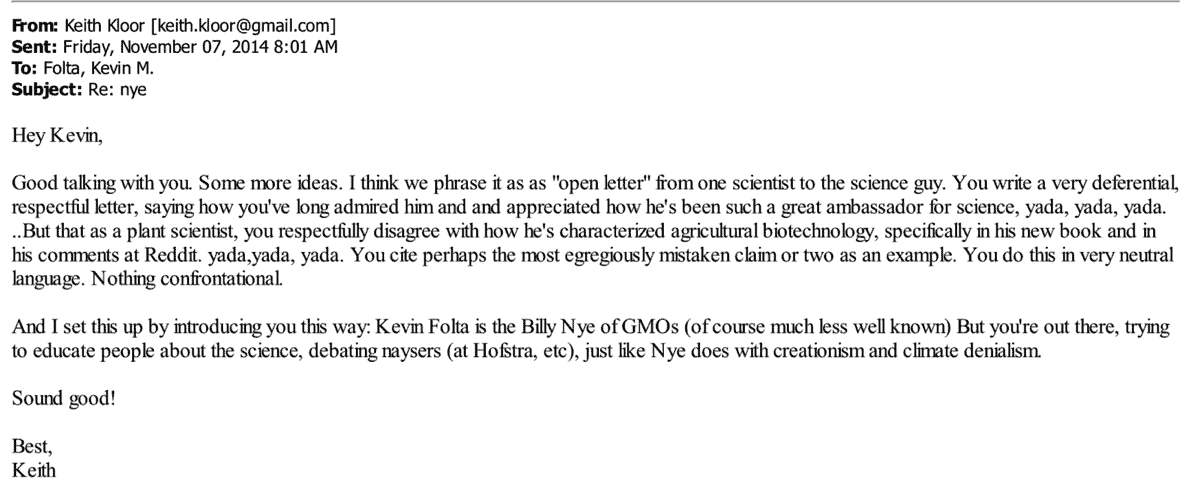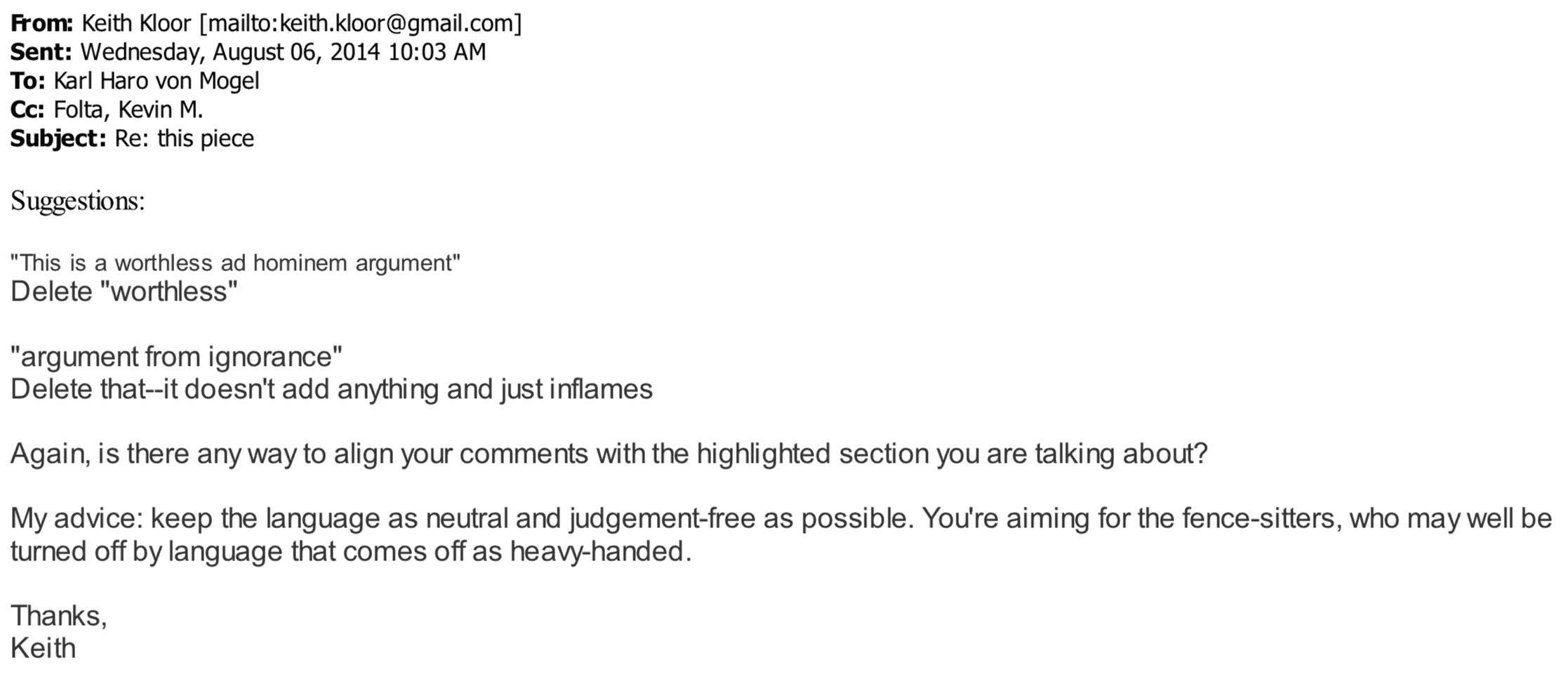Keith Kloor is a freelance journalist and an adjunct journalism faculty member at New York University who has written for Nature, Science Insider, Slateand dozens of articles for Discover Magazinepromoting genetically engineered foods and attacking critics of the pesticide industry, while also assisting industry public relations efforts behind the scenes.
Emails obtained by U.S. Right to Know, posted in the UCSF Chemical Industry Documents Library, reveal instances in which Kloor coached and edited his sources, obscured the industry ties of a source, and selectively reported on information in ways that bolstered the pesticide industry’s product-defense narratives. Kloor declined to respond to questions for this article.
Preemptive, selective release of FOIA emails
From 2015 to 2017, Kloor reported for Nature , Science Insider , Discover , Issues in Science and Technology, and Slate on a public records investigation by U.S. Right to Know to uncover hidden ties between the pesticide industry and publicly funded academics, including University of Florida Professor Kevin Folta, who promote GMOs and pesticides and argue to keep these products unregulated. In each of these published pieces, Kloor framed the public records requests as an undue burden on academics.
The emails obtained via state records requests reveal that Kloor himself was part of the story he was reporting on; emails reveal Kloor had attended pesticide industry-funded message-training conferences with Folta and assisted Folta with messaging. The correspondence also shows that Folta reached out to Kloor to suggest a “preemptive” release of his emails “but selectively” to help mitigate the damage of the documents – which Kloor did, in the journal Nature.
At the same time as Kloor was covering the story for top science publications, the documents show he participated in discussions with industry insiders about the challenges posed by the public records requests.Here is a timeline of Kloor’s reporting and related industry collaborations:
- March 2014: Kloor attended the Biotech Literacy Project boot camp, an industry-funded conference to train scientists and journalists how to frame the debate over GMOs and pesticides. The conference was hosted by Folta and organized by Genetic Literacy Project and Academics Review, two groups that partnered with Monsanto on public relations projects.
- July 2014: Monsanto agreed to fundFolta’s proposal for $25,000 for promotional events for GMOs, which Folta described as a “solution to the biotech communications problem.” (Folta donated the money to a food bank after the proposal became public.)
- In August and November of 2014, Kloor provided Folta with messaging advice about how to challenge critics of GMOs, the emails show.
- February 2015: U.S. Right to Know submitted public records requests for correspondence to and from professors at public universities, including Folta, to investigate undisclosed collaborations with pesticide companies and their PR firms.
- February 2015: Kloor wrote about the USRTK investigation for Science Insider, quoting Dr. Folta and other industry allies who were “rattled” by the open records requests they described as a “fishing expedition” that could have a “chilling effect on academic freedom.”
- March 2015: Kloor gave a presentation to the Cornell Alliance for Science, a PR campaign for GMOs funded by the Gates Foundationthat was campaigning against the public records requests.
- June 2015: Kloor appeared at a second industry-funded Biotech Literacy Project boot camp message-training held at UC Davis, on a panel to discuss “FOIA Challenges” with Folta and University of Illinois Professor Emeritus Bruce Chassy, whom emails later revealed had also been secretly receiving funds from Monsanto.
- August 1, 2015: Folta emailed Kloor to report that his emails had been turned over to U.S. Right to Know in response to the open records requests. “I started going through this last night and I’m thinking that a preemptive release of the materials is a good idea, but selectively,” Dr. Folta wrote. He suggested a framing that “exposes the danger of the FOIA laws.”
- August 6, 2015: Kloor reported on the emails in a forgiving article for Nature. The emails “do not suggest scientific misconduct or wrongdoing by Dr. Folta. But they do reveal his close ties to agriculture giant Monsanto,” Kloor reported.
- August 8, 2015: Jon Entine of Genetic Literacy Project,who organized the industry-funded boot camps, complained to Kloor about his use of the term “close ties” to describe Dr. Folta’s relationship with Monsanto. “It’s both incorrect and inflammatory. It reflects poorly on what otherwise was first class reporting,” Entine wrote. Kloor said the term was “arguable” but backed away from it: “In my defense, I didn’t write that – it was added in the final edits.” He then tipped Entine off about the emails: “You and I should also talk. You are in the emails.” Kloor was also in the emails, which he did not mention in his reporting. (Subsequent requests turned up more emails involving Kloor.)
- September 5, 2015: a front-page New York Times article by three-time Pulitzer Prize winner Eric Lipton reported that Monsanto recruited academics, including Dr. Folta, to fight against GMO labeling. The Times posted emails from Dr. Folta and Dr. Chassy revealing undisclosed industry payments to both men and their collaborations with pesticide companies and their PR firms.
- Kloor continued to engage in the debate as a journalist for industry events, such as a February 2016 forum hosted by GMO Answers, a marketing campaign to promote GMOs funded by Bayer/Monsanto, Syngenta, BASF, and DowDuPont, and managed by the public relations firm Ketchum.
- Folta suedthe New YorkTimes and Eric Lipton over the 2015 article. Kloor reported on Folta’s lawsuit for Slate in 2017 without disclosing his now-public collaborations with Folta and other industry insiders. Folta never disclosed who paid for the lawsuit (which has since been dismissed).
- August 2019: Newly released Monsanto documents established that the company and its PR firms, including GMO Answers, had a campaign to frame the U.S. Right to Know investigations as an attack on academic freedom, the same messaging Kloor advanced in his articles for science publications.
Coaching, editing sources; obscuring industry ties
The emails suggest Kloor worked with his sources behind the scenes to hone their messaging in support of a key pesticide industry cause: convincing wary consumers to accept genetically engineered foods. One of these sources was Kevin Folta, the University of Florida professor who was the key figure Kloor featured in stories he wrote for science publications about academic transparency.
Campaign to convert Bill Nye
In November 2014, Kloor used his Discoverblog to challengecritiques about GMOs that Bill Nye, a science educator known as “Bill Nye the Science Guy,” had written in a book. Kloor published an “Open Letter to Bill Nye from a Plant Scientist” signed by Folta— but Kloor did not disclose that he had asked Folta to challenge Nye, had concocted the idea of the open letter and had coached Folta on how to write it.Kloor alsoedited Dr. Folta’s biography to avoid mentioning industry funding, according to the emails.

The emails show that Kloor had drafted a bio for Folta that included the line, “No research is sponsored by Monsanto.” Folta asked him to adjust that sentence, noting that Monsanto indirectly sponsored some of his biotech outreach efforts and that he had received research money from a small biotech firm. Kloor decided on a bio that avoided mentioning Dr. Folta’s industry funding entirely: “his research is sponsored by federal and state agencies.”
_____
Kloor provided guidance to Dr. Folta about how to write the letter to Nye:

_____
Around the same time, Monsanto was also lobbying Nye to change his position on GMOs, which they eventually succeeded in doing. A March 2015 Washington Poststory about Nye’s conversion claimed that Nye’s criticisms of GMOs “had angered many scientists,” but the only evidence the article provided to support that claim was a link to Dr. Folta’s “open letter” published on Keith Kloor’s Discover blog.
Mother Jones coverage of Nye’s conversion on GMOs.
Discover: “Not our policy to prompt sources”
Emails from August 2014 show Kloor offering messaging advice to Dr. Folta and another source, Dr. Karl Haro von Mogel, the media director of the GMO promotion group Biofortified. Kloor asked them to critique an article by Carole Bartolotto, a dietician who had written critically about GMOs. The emails show that Kloor edited the comments and suggested ways to strengthen the messaging: “My advice: keep the language as neutral and judgment-free as possible. You’re aiming for the fence-sitters, who may well be turned off by language that comes off as heavy handed.”

For a 2017 Huffington post article, journalist Paul Thacker asked Discover magazine editor Becky Lang to comment on the Bartolotto emails. Lang declined to comment on specifics of Kloor’s reporting, but said: “Of course, it’s not our policy now, and never has been, to prompt sources to write criticism, edit criticism, and then run it as independent. It’s also not our policy to ever help sources try to hide their industry relationships.” (Kloor’s Discover blog ended in ended in April 2015.)
Jon Entine, Genetic Literacy Project connection
Kloor’s prolific writings in defense of the pesticide industry can be viewed on the website of the Genetic Literacy Project, a promotional website for pesticides and GMOs that features dozens of articles written by Kloor or quoting his work. Genetic Literacy Project is run by Jon Entine, a longtime PR operative who promotes and defends chemical industry interests. (Genetic Literacy Project disclosed direct funding by Bayer as of 2022.) Entine is principal of the PR firm ESG MediaMetrics, whose clients included Monsanto. Kloor and Entine use similar messaging and frame the issues in similar ways, and appear to have a close relationship, according to the emails.
In a July 2013 email to a pesticide industry lobby group, Entine described Kloor as a “very good friend of mine” who could help broker a meeting with another Discover blogger to write about pesticide industry activities in Hawaii. Another email shows Entine connecting Kloor with Rebecca Goldin at George Mason University to discuss “abuse of FOIA.” Goldin works with Entine’s former employer STATS, a group journalists have described as a “disinformation campaign” that uses tobacco tactics to manufacture doubt about chemical risk.
In another email from October 2014, Kloor was the only journalist included in an email warning from Ketchum public relations firm about a possible hacking operation on corporate websites by the group Anonymous. The email was forwarded by Adrianne Massey, managing director of the biotechnology industry trade association to a group of industry allies, including Entine.
“I have no idea what type of attack. Private sector entities may be their only targets, but I don’t want any of you to be harmed by those who see you as industry spokespeople,” Massey wrote.
Kloor was looped in on the email by Dr. Channapatna Prakash, a GMO advocate and dean at Tuskegee University. Also included in the email were Jay Byrne ( former director of corporate communications for Monsanto), Val Giddings ( former vice president of the biotech trade association), Karl Haro von Mogel (media director of Biofortified), Bruce Chassy and David Tribe (co-founders of the Monsanto front group Academics Review), and other key industry allies who promote GMOs and advocate for deregulation: Kevin Folta, Henry Miller, Drew Kershen, Klaus Ammann, Piet van der Meer and Martina Newell-McGloughlin.
Industry allies frequently promote Kloor’s work; see tweets by Robb Fraley of Monsanto, Jon Entine, Genetic Literacy Project and the agrichemical industry trade group CBI.
Further reading
- Keith Kloor’s Enduring Love Affair with GMOs, by Paul Thacker, Huffington Post
- Greenpeace Polluter Watch page on Keith Kloor
- Journalists Mentioned in our FOIA Requests by U.S. Right to Know









